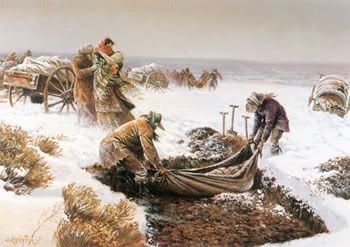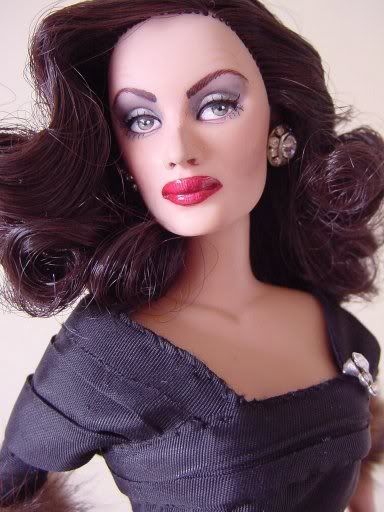Most likely, in Mormon congregations throughout the world, but especially in the western U.S., today is being honored as "Pioneer Day." This day celebrates and memorializes the moment when Brigham Young, sick from the long, long journey, sat up from his bed in the back of his wagon, pointed out over what would soon be called the Salt Lake Valley, in what the saints would call the State of Deseret, but that the United States would derisively name Utah (after the Ute Indians of the region, who were said to run around in very little clothing; the joke was that because Mormon men had many wives, and therefore spent a lot of time attending to matrimonial duties, they didn't bother putting on clothes) and said "
This is the place," bringing to an end a journey that had begun in the cold of winter, when the Mormon settlement in Nauvoo, Illinois had been burnt to the ground and the saints had fled the U.S.
Pioneer Day falling on a Sunday means that on this day, sacrament meetings (what the main service in Mormon churches is called--where you take the bread and water sacrament, listen to talks from members of the congregation, and--best part--sing hymns) are being opened or closed with the Mormon hymn "Come, Come Ye Saints," and speakers are memorializing their ancestors' sacrifices, as they left the hostile United States and ventured into the territories. Maybe they are drawing parallels to current times, when Christianity sees itself as under attack, admonishing each other to stay the course, be brave, and have faith. Maybe they are pausing to be grateful for their comfort and wealth and security; for their limbs which didn't fall off from frostbites; for the family members who sit comfortably in the pews in front of them, not having died and been buried in makeshift graves along the road; for the roast beef cooking slowly even as they speak, in anticipation of the
Sunday dinner they will eat in a few hours, in their middle class homes, protected from wild animals and the elements.
When I was a kid, my ward (congregation) used to have Pioneer Day picnics in the park, with a childrens' parade. We decorated our bikes and dressed as pioneers. I LOVED getting to wear a pioneer bonnet--I would have worn one every day if I could. I have a distinct memory of playing in the sand afterwards, one year, still in my dress and bonnet, and poo-pooing the new movie all the boys were talking about,
Star Wars. "I'll bet it'll be stupid," I remember saying.
As soon as I remembered that today is Pioneer Day, I started this entry, planning on noting the day and then making sarcastic remarks about Mormons and their goofy celebrations and their
creamy, squishy,
no-need-to-chew food--the treacly-sweet red
punches, the cheesy, cream-of-soupy
funeral potatoes, the squishy white Parker House rolls and endless parade of
jello salads. We have tentative plans to have people over tonight. I thought, okay, I'll run to the store and pick up some ingredients, and serve my friends a Mormon-style Sunday dinner, heat be damned.
But first I pulled up i-tunes and checked to see if they had "Come, Come Ye Saints" in the data base, because I was feeling kind of homesick for it. (Notice the familar Freshman English-style conversion narrative rhetorical strategy.) Of course they did, sung by the Mormon Tabernacle Choir. So I bought it, because it's only a buck, right? So I girded my loins and
listened to the hymn, (written in 1846, while the pioneers were still mid-journey, and tired, and hungry, and scared, but hopeful) which is THE quintessentially Mormon hymn. Predictably, I cried, because I still don't know what to do with my feelings of pride in my ancestors, horror at their imperialism, sadness at the current church's
ideology of exclusion and hatred. But mostly, I cried out of pure longing and sadness. I cried because I left my people, and I'll never really belong anywhere again. I don't often feel like this, but today, as I listened to the hymn, I did.
One year, on a visit to Utah, my grandmother decided to buy each of her grandchildren a copy of this illustration of the Willie Handcart Company, which her grandmother had been in.

The company set out from the east coast much too late in the season, in handcarts hastily made of still-green wood. By the time they got to the Rocky Mountains, the winter snows made it impossible to go any further, and the company lost many members before rescue parties arrived. My great-great grandfather, who had baptized my great-great grandmother in England a year earlier, was in the rescue party and after their snowy reunion they got married. She was the first of his four wives. My grandmother wanted us all to have this picture so that we would remember our heritage, and be proud of it.
Come, come, ye saints, no toil nor labor fear;
But with joy, wend your way.
Though hard to you this journey may appear,
Grace shall be as your day.
’Tis better far for us to strive
Our useless cares from us to drive;
Do this, and joy your hearts will swell
All is well! All is well!
We'll find the place which God for us prepared,
Far away, in the West,
Where none shall come to hurt or make afraid;
There the saints will be blessed.
We'll make the air with music ring,
Shout praises to our God and King;
Above the rest these words we'll tell,
All is well! All is well!



